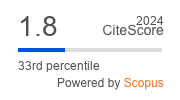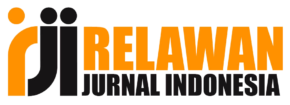Requirement Elicitation Modeling Using Knowledge Acquisition in Automated Specification Method
Abstract
Errors often occur during the requirements elicitation stage, causing failure of the software development process as a whole, so that the built system cannot be used optimally; these data are obtained from survey data from several large companies involved in technology development. To overcome this problem, this study tries to apply the elicitation requirements using the KAOS method in the case study of the SMM reseller ordering system to obtain system requirements that are in accordance with the goals and objectives of each existing stakeholder. Based on the elicitation of system requirements, functional requirements are generated that include automatic orders, automatic payments, manage product sales, manage orders, manage payment methods, manage problem orders, manage customer data, manage company information, automatic email notifications, and sales statistics information. The results of this study are a table of functional requirements that have been declared valid and in accordance with the goals and requirements of each stakeholder after evaluating and validating the results for each stakeholder involved.
Downloads
References
S. ARUN KUMAR and T. ARUN KUMAR, “Study the impact of Requirements management Characteristics in global software development projects: An Ontology based approach,” Int. J. Softw. Eng. Appl., vol. 2, no. 4, pp. 107–125, 2011, doi: 10.5121/ijsea.2011.2410.
K. P. Lunak, “Kakas Bantu Sistem Rekomendasi Kebutuhan Perangkat Lunak,” vol. 1, no. 1, 2018.
W. A. Kusuma, “Elisitasi Kebutuhan Menggunakan User Persona Untuk Memenuhi Ekspektasi Pengguna iLab,” in Prosiding SENTRA (Seminar Teknologi dan Rekayasa), 2021, no. 6, pp. 85–93.
A. C. Puspitaningrum and E. S. Sintiya, “Teknik Elisitasi Kebutuhan Perangkat Lunak : Literatur Review,” vol. 8, no. 1, 2022.
F. Adikara, H. Gunawan, and S. Sandfreni, “Pemodelan Hasil Elisitasi Kebutuhan Sistem Penjualan Online Menggunakan Metode Knowledge Acquisition in Automated Specification,” J. Edukasi dan Penelit. Inform., vol. 4, no. 2, p. 108, 2018, doi: 10.26418/jp.v4i2.28016.
M. F. Takwa, D. S. Rusdianto, E. Muhammad, and A. Jonemaro, “Pembangunan Kakas Bantu Pembangkitan Kebutuhan Pengguna berdasarkan Model Proses Bisnis,” vol. 3, no. 10, pp. 10191–10198, 2019.
H. Arief Raharjo, Widodo, and H. Ajie, “Perancangan Model Gore Menggunakan Metode Kaos untuk Proses Reverse Engineering Sistem Informasi,” PINTER J. Pendidik. Tek. Inform. dan Komput., vol. 3, no. 1, pp. 18–26, 2019, doi: 10.21009/pinter.3.1.4.
M. Difa, I. Djajus, S. Widowati, and J. H. Husen, “Implementasi Metode Knowledge Acquisition in Automated Specification ( KAOS ) pada Sistem Informasi Pengelola Inventori di Bagian Teknik TVRI Stasiun Jawa Barat,” vol. 6, no. 2, pp. 8954–8965, 2019.
N. Falih, “Analisa Kebutuhan E-commerce untuk UKM Menggunakan Goal-Oriented Requirement Engineering (GORE),” Inform. J. Ilmu Komput., vol. 15, no. 1, p. 11, 2019, doi: 10.52958/iftk.v15i1.1064.
F. A. Maulana, S. Widowati, and J. H. Husen, “Penerapan Metode Tropos pada Sistem Informasi Penugasan di Bidang Program TVRI Stasiun Jawa Barat,” vol. 6, no. 2, pp. 9299–9312, 2019.
F. A. Syahman, S. Widowati, and ..., “Penerapan Metode TROPOS Untuk Rekayasa Kebutuhan Pada Pembangunan Sistem Informasi Pengelola Gudang Mobil di PT. Istana Bandung Raya Motor,” eProceedings …, vol. 6, no. 2, pp. 9313–9324, 2019.
A. Khair, Implementasi Dan Analisis Goal-Based Requirement Analysis Method ( Gbram ) Dengan Studi Kasus : Sistem Informasi Apotek Ananda Implementation and Analysis Goal-Based Requirement Analysis Method ( Gbram ) on Case Study : Ananda Pharmacy Information System. 2017.
Y. Kamalia, “Implementasi Goal Oriented Requirement Engineering Menggunakan Knowledge Acquisition in autOmated Spesification Untuk Pengelolaan Administrasi Kepolisian Sindangkerta,” vol. 6, no. 2, pp. 8943–8953, 2019.
R. Janah and Y. Syafitri, “Membangun Aplikasi Pemesanan Barang Berbasis Web Dengan Menggunakan Framework Ajax Pada Penamart Bandar Lampung,” J. JUSINTA, vol. 3, no. 2, pp. 11–15, 2019.
F. Adikara, S. Sandfreni, and R. Prastya, “Penerapan Metode Organization Goal-Oriented Requirements Engineering (OGORE) untuk Pembangunan Sistem Pendaftaran Klinik Fisioterapi,” J. Edukasi dan Penelit. Inform., vol. 6, no. 3, p. 308, 2020, doi: 10.26418/jp.v6i3.41082.
Copyright (c) 2023 Jurnal RESTI (Rekayasa Sistem dan Teknologi Informasi)

This work is licensed under a Creative Commons Attribution 4.0 International License.
Copyright in each article belongs to the author
- The author acknowledges that the RESTI Journal (System Engineering and Information Technology) is the first publisher to publish with a license Creative Commons Attribution 4.0 International License.
- Authors can enter writing separately, arrange the non-exclusive distribution of manuscripts that have been published in this journal into other versions (eg sent to the author's institutional repository, publication in a book, etc.), by acknowledging that the manuscript has been published for the first time in the RESTI (Rekayasa Sistem dan Teknologi Informasi) journal ;








